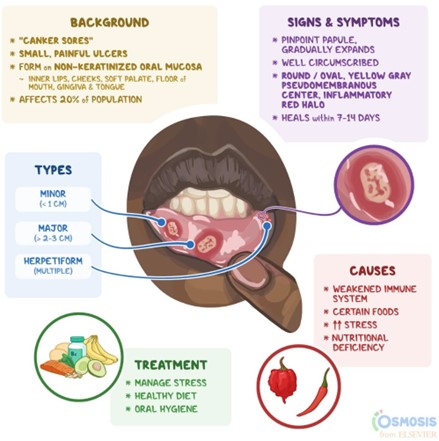The practical nurse (PN) learns that a client who is receiving chemotherapy has developed stomatitis.
Which information should the PN obtain from the client during a focused assessment?
Urinary output.
Ability to swallow.
Frequency of bowel movements.
Blood pressure while standing.
The Correct Answer is B
Stomatitis refers to the inflammation of the mouth and oral mucosa, which can cause pain and difficulty swallowing. In the context of a client receiving chemotherapy, stomatitis is a common side effect that can occur due to the effects of chemotherapy on rapidly dividing cells, including those in the oral cavity. When a client develops stomatitis, it is important for the practical nurse (PN) to obtain information about the client's ability to swallow during a focused assessment. This is because stomatitis can significantly impact a client's ability to eat and drink comfortably, which can lead to dehydration and malnutrition. Assessing the client's ability to swallow helps determine the extent of the issue and guides appropriate interventions and support.
Let's briefly evaluate the other options:
a) Urinary output.
Urinary output is not directly related to stomatitis. Stomatitis primarily affects the oral cavity, and its impact on urinary output is minimal or nonexistent. While monitoring urinary output is important for assessing hydration status, it is not the priority in this situation.
c) Frequency of bowel movements.
The frequency of bowel movements is unrelated to stomatitis. Stomatitis primarily affects the mouth, and its presence does not directly influence bowel movements. Assessing bowel movements may be relevant for other concerns, but it is not specifically related to stomatitis.
d) Blood pressure while standing.
Blood pressure while standing, also known as orthostatic blood pressure, is not directly relevant to stomatitis. Stomatitis primarily affects the oral cavity and does not typically have a direct impact on blood pressure. Assessing blood pressure while standing may be appropriate for other health concerns, such as orthostatic hypotension, but it is not the priority in this situation.
In summary, when a client receiving chemotherapy develops stomatitis, the practical nurse should focus on assessing the client's ability to swallow as it directly relates to the impact of stomatitis on the client's nutrition and hydration.

Nursing Test Bank
Naxlex Comprehensive Predictor Exams
Related Questions
Correct Answer is ["A","D","E"]
Explanation
Choice A rationale:
Correcting electrolytes that are out of normal range is a crucial goal of therapy for this client. In diabetic ketoacidosis (DKA), the body’s cells are unable to use glucose for energy due to a lack of insulin. This leads to the breakdown of fat for energy, producing ketones as a by-product. Ketones are acidic and can cause the blood’s pH to decrease, leading to metabolic acidosis. This process also leads to an increased production and excretion of electrolytes such as potassium and sodium. Therefore, correcting these electrolyte imbalances is a key goal of therapy.
Choice B rationale:
While promoting oxygenation to tissues is generally important in critical care, it is not a specific goal in the management of DKA. The primary issues in DKA are metabolic in nature, including hyperglycemia, ketosis, and acidosis.
Choice C rationale:
Preventing hyperventilation is not a specific goal in the management of DKA. Hyperventilation in DKA is a compensatory mechanism for metabolic acidosis (Kussmaul breathing). The body tries to expel more carbon dioxide to reduce the acidity of the blood.
Choice D rationale:
Reversing dehydration is another important goal of therapy for this client. In DKA, high blood glucose levels lead to osmotic diuresis, where water is drawn into the urine from the blood, leading to dehydration. This can cause hypotension and reduced tissue perfusion. Therefore, reversing dehydration through fluid replacement is a key part of treatment.
Choice E rationale:
Replacing insulin is a fundamental goal of therapy for this client. Insulin deficiency is the primary cause of DKA. Insulin allows glucose to enter cells where it can be used for energy, preventing the breakdown of fat for energy and the subsequent production of ketones.
Choice F rationale:
Providing respiratory support may be necessary in severe cases of DKA where the patient’s compensatory respiratory efforts are insufficient to maintain adequate gas exchange. However, it is not one of the primary goals of therapy in DKA management.
Correct Answer is B
Explanation
The correct answer is choice B.
Choice A rationale: Metabolic alkalosis is caused by a loss of acid or a gain of base. It is not typically associated with anxiety or hyperventilation.
Choice B rationale: Respiratory alkalosis is caused by hyperventilation, which leads to a decrease in carbon dioxide levels in the blood. This can occur in response to anxiety, pain, or other stressors.
Choice C rationale: Metabolic acidosis is caused by a buildup of acid in the blood or a loss of bicarbonate. It is not typically associated with anxiety or hyperventilation.
Choice D rationale: Respiratory acidosis is caused by hypoventilation, which leads to an increase in carbon dioxide levels in the blood. It is not typically associated with anxiety or hyperventilation.
Whether you are a student looking to ace your exams or a practicing nurse seeking to enhance your expertise , our nursing education contents will empower you with the confidence and competence to make a difference in the lives of patients and become a respected leader in the healthcare field.
Visit Naxlex, invest in your future and unlock endless possibilities with our unparalleled nursing education contents today
Report Wrong Answer on the Current Question
Do you disagree with the answer? If yes, what is your expected answer? Explain.
Kindly be descriptive with the issue you are facing.
